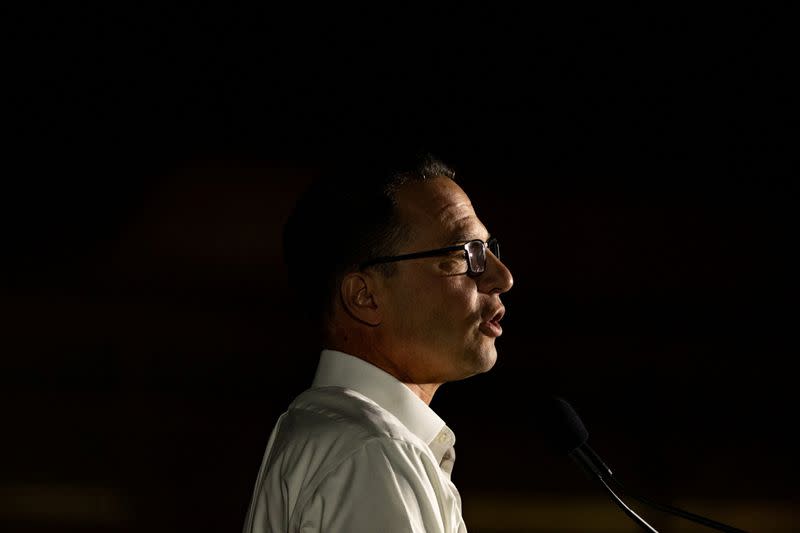Democrats win governors' races in three crucial 'blue wall' states
- Oops!Something went wrong.Please try again later.
- Oops!Something went wrong.Please try again later.
- Oops!Something went wrong.Please try again later.
- Oops!Something went wrong.Please try again later.
- Oops!Something went wrong.Please try again later.
By Daniel Trotta and Julia Harte
(Reuters) -Democrats won elections for governor in the "blue wall" states of Michigan, Pennsylvania and Wisconsin on Tuesday, enabling them to resist Republican efforts in those states to restrict abortion and voting rights.
Democratic Governors Gretchen Whitmer of Michigan and Tony Evers of Wisconsin were re-elected, while Josh Shapiro succeeded an outgoing Democratic governor in Pennsylvania, according to projections from Edison Research.
The three states served as a "blue wall" that helped Democrat Joe Biden defeat Republican then-President Donald Trump in 2020, when Republican officials tried to overturn those results.
Republicans control the state legislatures in Pennsylvania and Wisconsin, making the governorships crucial to vetoing legislation. In Pennsylvania, some media outlets projected Democrats would win a majority in the state House of Representatives, which would leave the legislature split between parties. Democrats won both houses of Michigan's legislature on Tuesday, taking full control of state government for the first time in decades, according to media reports.
In Kansas, the only governorship that Democrats were defending in a state won by Trump in 2020, Governor Laura Kelly defeated Republican challenger Derek Schmidt, according to Edison Research.
Nationally there were 36 state governor's races on U.S. midterm election ballots on Tuesday, with the future of abortion rights and election oversight at risk in competitive contests around the country.
Democrats were ahead by a net two seats, with more tight races on the West Coast yet to be decided, but Republican incumbents cruised to victories in marquee races in Florida, Georgia and Texas, Edison Research projected.
The high stakes brought increased money and attention to the state-level races, which often get overshadowed in midterm elections by the fight for control of Congress.
In Pennsylvania, Shapiro defeated Republican election denier Doug Mastriano in a presidential battleground state where the governor appoints the official who oversees elections.
Mastriano has echoed Trump's false claims about voting fraud and was present at the U.S. Capitol on Jan. 6, 2021 - the day of a deadly riot - to protest the results of the 2020 presidential election.
Mastriano told supporters late on Tuesday he would respect the election results, but said there were too many votes outstanding and he wanted to see "what the voters have to say."
In Michigan, Democrat Whitmer won a second term, having campaigned hard on abortion rights after the U.S. Supreme Court overturned the constitutional right to abortion. Her Trump-backed opponent, commentator Tudor Dixon, supported a near-total ban on abortion, including for child victims of rape and incest.
Wisconsin's Democratic Governor Evers narrowly defended his seat against Republican construction magnate Tim Michels, who had falsely claimed that Trump won the 2020 election.
Michels had promised, if elected, to enforce a 19th-century abortion ban that Evers is challenging in court.
DEMOCRATIC PICKUPS
Democrats picked up governorships in Massachusetts and Maryland with history-making candidates.
Massachusetts Democratic Attorney General Maura Healey became the first woman to ascend to that state's highest office, and she also will be the country's first openly lesbian governor.
Another barrier was broken in Maryland, where Democrat Wes Moore became the state's first African American candidate to win an election for governor.
Women of both parties had a good night, as a record number of women will hold governorships when they are all sworn in. There could be as many as 12 women governors, up from the current record of nine.
In New York state, where Republicans last won 20 years ago, Democratic Governor Kathy Hochul survived a challenge from Republican Lee Zeldin, who campaigned hard on the issue of crime. Hochul, a former lieutenant governor who ascended when former Governor Andrew Cuomo resigned, became the first woman elected to the post in New York.
Republican Sarah Huckabee Sanders, who was one of Trump's White House press secretaries, was elected as Arkansas' first woman governor. Her father, Mike Huckabee, is a former Republican governor of the state.
But in Georgia, Democrat Stacey Abrams came up short against Republican Governor Brian Kemp in a rematch of their 2018 race. Abrams' strong run four years ago made her a Democratic star nationally, but Kemp was ahead by nearly 8 percentage points with 96% of the projected vote counted.
In Texas, Republican Governor Greg Abbott won a third term over Democratic challenger Beto O'Rourke, a former U.S. congressman who became a national Democratic figure after a close loss in a Senate race four years ago and a run for the 2020 Democratic presidential nomination.
Florida Governor Ron DeSantis coasted to re-election, defeating Democratic challenger Charlie Crist by nearly 20 percentage points with 98% of the expected vote counted.
DeSantis, 44, is expected to seek the Republican presidential nomination in 2024. That likelihood has drawn the ire of Trump, 76, who has nicknamed him "Ron De-Sanctimonious."
Trump has said he will make a major announcement next Tuesday, when he is widely expected to declare his candidacy.
(Reporting by Daniel Trotta in Carlsbad, California; Additional reporting by Julia Harte in New York and Jarrett Renshaw in Harrisburg, PennsylvaniaEditing by Colleen Jenkins, Howard Goller, Will Dunham, Aurora Ellis , Claudia Parsons and Jonathan Oatis)


